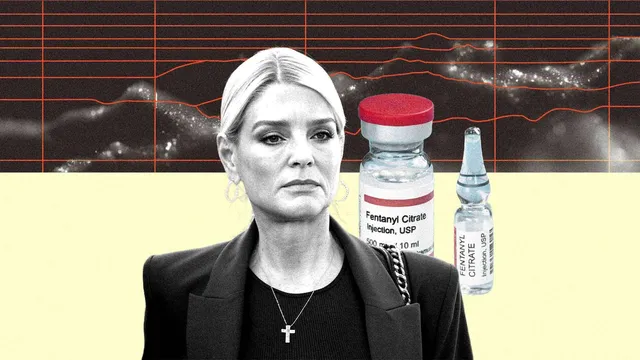
Pam Bondi claims Trump's drug policy saved 258 million lives
2025-05-02 00:00- Pam Bondi claimed during a DEA lab visit that over 22 million fentanyl pills were seized during Trump's first 100 days, saving 258 million lives.
- Her assertion has been criticized as lacking logical basis and equating drug seizures directly to saved lives, which is implausible.
- Critics argue that this rhetoric highlights the failures of the war on drugs and how prohibition increases dangers for users.
Express your sentiment!
Insights
In the United States, on April 29, 2017, U.S. Attorney General Pam Bondi visited a forensic lab at the Drug Enforcement Administration (DEA) headquarters. During this visit, she asserted that the Trump administration's efforts in combating drug trafficking led to significant fentanyl pill seizures, claiming that over 22 million fentanyl-laced pills were seized and that this action saved approximately 258 million lives within the first 100 days of Trump’s presidency. This assertion inherently raises skepticism, as it suggests that nearly every adult American would have died from fentanyl overdoses without these seizures, insinuating a direct causative relationship between drug seizures and lives saved that lacks strong empirical support. Following Bondi's comments, analysts criticized her statements as advocating illogical drug war policies, highlighting the absurdity of suggesting that the seizure of drugs can prevent deaths on such a large scale. The claims were met with ridicule, both in media discourse and public forums. Comparisons were drawn to past metrics that agency officials typically used, which have been criticized for their lack of logical basis. In fact, Bondi's assertion of saving three-quarters of the American population from an overdose is juxtaposed against statistics regarding actual fatalities from drug overdoses, revealing a significant discrepancy between political rhetoric and reality. Furthermore, the prosecution of fentanyl-related cases was emphasized by Bondi in collaboration with the Trump administration. In a related cabinet meeting, she said that the achievements, including several million fentanyl pills seized and thousands of kilograms of fentanyl intercepted, represented a success. However, experts disputed that simply seizing drugs reduces their prevalence in the market, stating that drug prices and availability remain affected by broader economic factors rather than seizure amounts alone. Experts in the field argue that prohibition strategies can sometimes produce more significant harm than benefit, noting that users often cannot verify the contents of the drugs they procure due to their illicit nature. This lack of knowledge increases the danger of overdosing on fentanyl-laced substances, which can be a genuine hazard for those in the drug market. Bondi’s remarks, though intended to bolster a narrative of a successful administration, ultimately highlight the disconnect between the proclaimed successes of drug enforcement policies and the complex realities of drug usage and overdose issues in American society.
Contexts
The effectiveness and criticisms of the war on drugs have been debated extensively since its inception in the 1970s. Initiated by then-President Richard Nixon, this effort aimed to combat drug abuse and trafficking in the United States. The government implemented strict law enforcement measures, increased funding for drug-related enforcement, and pushed for harsher penalties for drug offenses. Advocates argued that these strategies were necessary to protect public health and reduce crime; however, over the decades, criticisms have surfaced questioning the policies' efficacy and societal consequences. Despite substantial investments, drug use and trafficking have persisted, leading many to label the war on drugs a failure. One of the primary criticisms of the war on drugs is its disproportionate impact on marginalized communities. Mandatory minimum sentencing laws have resulted in severe penalties for non-violent drug offenses, contributing to mass incarceration. This has had long-term consequences for affected individuals and their communities, from diminished economic opportunities to increased family destabilization. Furthermore, the focus on law enforcement over public health initiatives has neglected the underlying issues of addiction and mental health, often stigmatizing individuals seeking help. This punitive approach has prompted calls for reform, emphasizing the importance of treating addiction as a public health issue rather than strictly a criminal one. The international aspect of the war on drugs also faces scrutiny. Many countries that have partnered with the U.S. in drug eradication efforts, such as Colombia and Mexico, have experienced violence and instability as a result. Drug cartels have thrived in the power vacuums created by aggressive enforcement tactics. Critics argue that instead of diminishing the global drug trade, the war on drugs has fueled conflict and corruption, often destabilizing entire regions. Efforts to combat drug trafficking through military assistance or aggressive policing have not effectively dismantled the infrastructure of these organizations. In recent years, there has been a growing shift towards reforming drug policies, which includes decriminalization and the legalization of certain substances. Countries like Portugal have adopted comprehensive harm reduction strategies that prioritize health and safety. These developing models offer a new paradigm focused on public health outcomes rather than criminalization. As society scrutinizes the war on drugs, it becomes increasingly clear that a multifaceted approach addressing addiction, mental health, and social equity is essential for effective policy change.